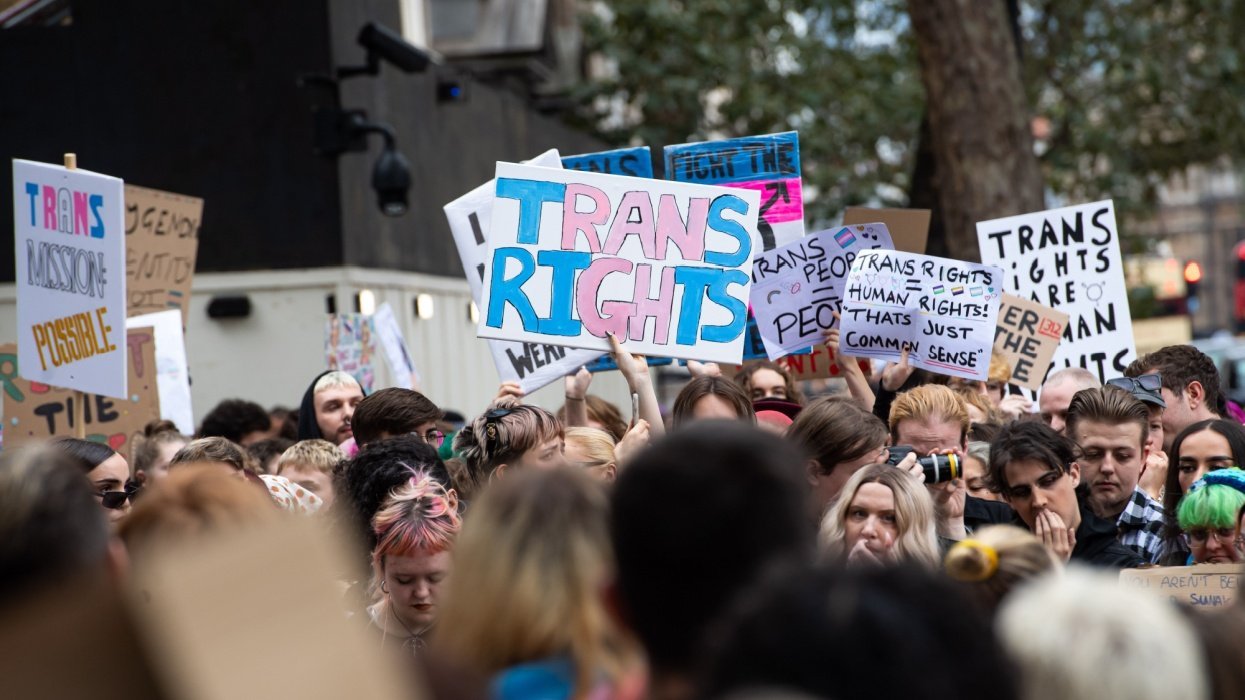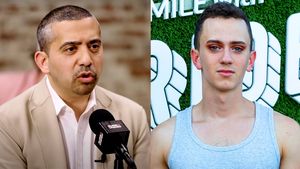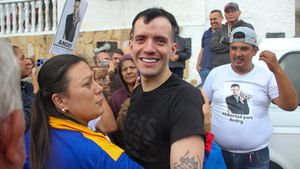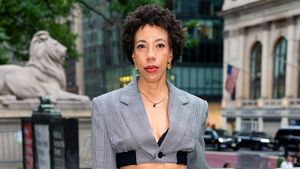We entered this Pride Month under siege. Across the country, anti-trans legislation, violent rhetoric, and policy rollbacks threaten our lives, our freedoms, and our futures. But Pride has never been about rainbow capitalism or empty celebration — it began as resistance, forged in the fires of police brutality and societal rejection. Pride is about survival. It’s about community. It’s about defiance. And above all, Pride is about truth. That’s why journalism — especially trans-led justice-centered journalism — is not just important right now; it’s essential. Our stories are shields. Our voices are weapons. And telling the truth is how we fight back.
Keep up with the latest in LGBTQ+ news and politics. Sign up for The Advocate's email newsletter.
The Trump administration has launched a calculated assault on LGBTQ people — especially trans communities — through an unprecedented wave of federal actions.
From threatening to withhold funding from universities and hospitals over trans-inclusive policies, to expelling trans service members after invasive and humiliating procedures, to literally erasing LGBTQ history and resources from federal websites, the message was brutally clear: our lives are disposable.
Sadly, this isn’t just limited to Trump. This year alone, Republican lawmakers across the country have introduced a record-breaking number of anti-LGBTQ+ bills, with 54 already signed into law. Each year since 2020, these attacks have grown more sweeping and cruel — banning Pride flags on public property, criminalizing access to gender-affirming care, prohibiting trans students from playing sports or using bathrooms, and even denying the right to update basic identity documents. This year, Iowa became the first state to fully repeal non-discrimination protections for trans people.
The goal is chilling and unmistakable: to force us back into the shadows, to a time before we could exist — let alone thrive — out in the open.
I remember that time. Growing up in Atlanta, being a Black trans woman from the South, I remember that at 12 years old, my stepfather stopped me from leaving the house because I was wearing a pink shirt. He told me, “You shouldn’t wear that. It’s for girls and people will think that you’re gay. It’s bad enough if people think that you support them.”
I remember thinking: if I couldn’t even wear colors associated with girls, how in the world was I supposed to be able to ever tell my family I actually was a girl? I remember swallowing my identity to survive, learning early that authenticity could come at too high a cost. My family thought they were protecting me by teaching me to hide. And now, decades later, we see the same flawed logic — dressed in policy and political rhetoric—being wielded to erase an entire generation of trans youth.
So even as we’ve made hard-won progress since I was a little girl in the South, powerful right-wing forces have been quietly working to drag us back. Republican-aligned think tanks like the Heritage Foundation and Focus on the Family have spent decades building the playbook we’re seeing unfold today.
At TransLash, we've exposed how these groups have systematically laundered anti-trans medical misinformation, cultivated anti-trans spokespeople, and tested messaging to weaponize trans people as political pawns. They knew exactly how to exploit the deep well of societal transphobia — one that crosses party lines.
Their strategy was chillingly effective: strip us of our own narratives by amplifying detransitioners, infiltrating mainstream newsrooms, undermining sound medical research, and flooding the public square with lies dressed up as debate. And by nearly every metric, they’ve succeeded — not because their ideas are right, but because their infrastructure is relentless.
That’s why I decided to launch TransLash in 2018. It started out as a three-part docuseries under the same name, which detailed what it was personally like to experience the initial wave of the anti-trans backlash started by the first Trump Administration. As a journalist, I understood how the endemic misconceptions about who we are had seeped into the foundations of establishment and the hearts of decision-makers who decide the fate of queer people. Little did I understand at the time that much of this success was the result of a deliberate campaign that had started four years prior in 2014. In fact this anti-trans infrastructure has been so effective at capturing trans narratives that now half the states in the nation have anti-trans laws on the books.
That’s why, now, more than ever, we need to tell OUR stories. Telling trans stories saves trans lives by creating a future that centers the humanity of transgender people. This is a future where our safety is assured, our rights are protected, and our humanity is affirmed.
That’s why I work to tell the stories of people standing up against trans hate by protecting young people and their families as they attend young queer events like Parasol Patrol. And Max Mowitz, who works to provide mutual aid in the face of daunting attacks against trans people in Iowa.
These stories stand to prove that we are not passive in this moment — we are powerful. That’s why storytelling is not just an act of expression; it’s an act of resistance.
At TransLash, we center trans voices — especially those of Black and Brown trans people — because we know that when we tell our own stories, we disrupt the narratives designed to erase us. Journalism becomes a frontline tool in the fight for our liberation. It reveals what those in power want hidden. It connects the dots between policy and lived experience. And it reminds us—and the world—that we are still here, still fighting, and still shaping the future. They may have the megaphones, but we have the truth. And that is something they can never fully silence.
Pride was never meant to be safe. It was never about comfort — it was about defiance in the face of erasure. As the attacks against us escalate, so must our visibility, our truth-telling, and our solidarity. This is not just a fight for trans rights — it is a fight for the soul of democracy, for the right to exist, to speak, to be seen. We are not going back. Not now. Not ever. So this Pride Month, let’s remember: the most radical thing we can do is to keep telling our stories, to keep standing in our truth, and to keep building a world where all of us — not just some of us — get to thrive.
Voices is dedicated to featuring a wide range of inspiring personal stories and impactful opinions from the LGBTQ+ community and its allies. Visit Advocate.com/submit to learn more about submission guidelines. Views expressed in Voices stories are those of the guest writers, columnists, and editors, and do not directly represent the views of The Advocate or our parent company, equalpride.








































































